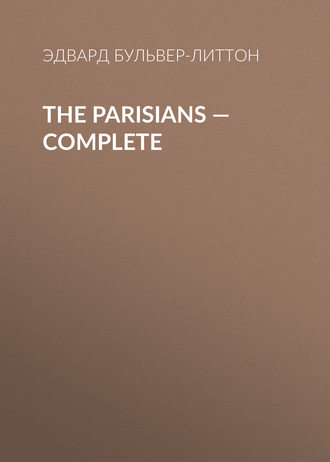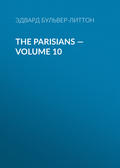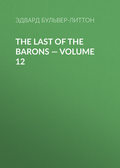
Эдвард Бульвер-Литтон
The Parisians — Complete
Isaura turned away pale, and involuntarily clasping her hands-as women do when they would suppress pain-replied, in a low murmur, “His manner was changed.”
Accordingly, Mrs. Morley sat down and wrote the following letter:
“DEAR MR. VANE,—I am very angry indeed with you for refusing my invitation—I had so counted on you, and I don’t believe a word of your excuse. Engagements! To balls and dinners, I suppose, as if you were not much too clever to care about such silly attempts to enjoy solitude in crowds. And as to what you men call business, you have no right to have any business at all. You are not in commerce; you are not in Parliament; you told me yourself that you had no great landed estates to give you trouble; you are rich, without any necessity to take pains to remain rich, or to become richer; you have no business in the world except to please yourself: and when you will not come to Paris to see one of your truest friends—which I certainly am—it simply means, that no matter how such a visit would please me, it does not please yourself. I call that abominably rude and ungrateful.
“But I am not writing merely to scold you. I have something else on my mind, and it must come out. Certainly, when you were at Paris last year you did admire, above all other young ladies, Isaura Cicogna. And I honoured you for doing so. I know no other young lady to be called her equal. Well, if you admired her then, what would you do now if you met her? Then she was but a girl—very brilliant, very charming, it is true—but undeveloped, untested. Now she is a woman, a princess among women, but retaining all that is most lovable in a girl; so courted, yet so simple—so gifted, yet so innocent. Her head is not a bit turned by all the flattery that surrounds her. Come and judge for yourself. I still hold the door of the rooms destined to you open for repentance.
“My dear Mr. Vane, do not think me a silly match-making little woman, when I write to you thus, a coeur ouvert.
“I like you so much that I would fain secure to you the rarest prize which life is ever likely to offer to your ambition. Where can you hope to find another Isaura? Among the stateliest daughters of your English dukes, where is there one whom a proud man would be more proud to show to the world, saying, ‘She is mine!’ where one more distinguished—I will not say by mere beauty, there she might be eclipsed—but by sweetness and dignity combined—in aspect, manner, every movement, every smile?
“And you, who are yourself so clever, so well read—you who would be so lonely with a wife who was not your companion, with whom you could not converse on equal terms of intellect,—my dear friend, where could you find a companion in whom you would not miss the poet-soul of Isaura? Of course I should not dare to obtrude all these questionings on your innermost reflection, if I had not some idea, right or wrong, that since the days when at Enghien and Montmorency, seeing you and Isaura side by side, I whispered to Frank, ‘So should those two be through life,’ some cloud has passed between your eyes and the future on which they gazed. Cannot that cloud be dispelled? Were you so unjust to yourself as to be jealous of a rival, perhaps of a Gustave Rameau? I write to you frankly—answer me frankly; and if you answer, ‘Mrs. Morley, I don’t know, what you mean; I admired Mademoiselle Cicogna as I might admire any other pretty, accomplished girl, but it is really nothing to me whether she marries Gustave Rameau or any one else,’—why, then, burn this letter—forget that it has been written; and may you never know the pang of remorseful sigh, if, in the days to come, you see her—whose name in that case I should profane did I repeat it—the comrade of another man’s mind, the half of another man’s heart, the pride and delight of another man’s blissful home.”
CHAPTER IV
There is somewhere in Lord Lytton’s writings—writings so numerous that I may be pardoned if I cannot remember where-a critical definition of the difference between dramatic and narrative art of story, instanced by that marvellous passage in the loftiest of Sir Walter Scott’s works, in which all the anguish of Ravenswood on the night before he has to meet Lucy’s brother in mortal combat is conveyed without the spoken words required in tragedy. It is only to be conjectured by the tramp of his heavy boots to and fro all the night long in his solitary chamber, heard below by the faithful Caleb. The drama could not have allowed that treatment; the drama must have put into words, as “soliloquy,” agonies which the non-dramatic narrator knows that no soliloquy can describe. Humbly do I imitate, then, the great master of narrative in declining to put into words the conflict between love and reason that tortured the heart of Graham Vane when, dropping noiselessly the letter I have just transcribed, he covered his face with his hands and remained—I know not how long—in the same position, his head bowed, not a sound escaping from his lips.
He did not stir from his rooms that day; and had there been a Caleb’s faithful ear to listen, his tread, too, might have been heard all that sleepless night passing to and fro, but pausing oft, along his solitary floors.
Possibly love would have borne down all opposing seasonings, doubts, and prejudices, but for incidents that occurred the following evening. On that evening Graham dined en famille with his cousins the Altons. After dinner, the Duke produced the design for a cenotaph inscribed to the memory of his aunt, Lady Janet King, which he proposed to place in the family chapel at Alton.
“I know,” said the Duke, kindly, “you would wish the old house from which she sprang to preserve some such record of her who loved you as her son; and even putting you out of the question, it gratifies me to attest the claim of our family to a daughter who continues to be famous for her goodness, and made the goodness so lovable that envy forgave it for being famous. It was a pang to me when poor Richard King decided on placing her tomb among strangers; but in conceding his rights as to her resting-place, I retain mine to her name,—Nostris liberis virtutis exemplar.”
Graham wrung his cousin’s hand-he could not speak, choked by suppressed tears.
The Duchess, who loved and honoured Lady Janet almost as much as did her husband, fairly sobbed aloud. She had, indeed, reason for grateful memories of the deceased: there had been some obstacles to her marriage with the man who had won her heart, arising from political differences and family feuds between their parents, which the gentle meditation of Lady Janet had smoothed away. And never did union founded on mutual and ardent love more belie the assertions of the great Bichat (esteemed by Dr. Buckle the finest intellect which practical philosophy has exhibited since Aristotle), that “Love is a sort of fever which does not last beyond two years,” than that between those eccentric specimens of a class denounced as frivolous and artless by philosophers, English and French, who have certainly never heard of Bichat.
When the emotion the Duke had exhibited was calmed down, his wife pushed towards Graham a sheet of paper, inscribed with the epitaph composed by his hand. “Is it not beautiful,” she said, falteringly—“not a word too much or too little?”
Graham read the inscription slowly, and with very dimmed eyes. It deserved the praise bestowed on it; for the Duke, though a shy and awkward speaker, was an incisive and graceful writer.
Yet, in his innermost self, Graham shivered when he read that epitaph, it expressed so emphatically the reverential nature of the love which Lady Janet had inspired—the genial influences which the holiness of a character so active in doing good had diffused around it. It brought vividly before Graham that image of perfect spotless womanhood. And a voice within him asked, “Would that cenotaph be placed amid the monuments of an illustrious lineage if the secret known to thee could transpire? What though the lost one were really as unsullied by sin as the world deems, would the name now treasured as an heirloom not be a memory of gall and a sound of shame?”
He remained so silent after putting down the inscription, that the Duke said modestly: “My dear Graham, I see that you do not like what I have written. Your pen is much more practised than mine. If I did not ask you to compose the epitaph, it was because I thought it would please you more in coming, as a spontaneous tribute due to her, from the representative of her family. But will you correct my sketch, or give me another according to your own ideas?”
“I see not a word to alter,” said Graham; “forgive me if my silence wronged my emotion; the truest eloquence is that which holds us too mute for applause.”
“I knew you would like it. Leopold is always so disposed to underrate himself,” said the duchess, whose hand was resting fondly on her husband’s shoulder. “Epitaphs are so difficult to write-especially epitaphs on women of whom in life the least said the better. Janet was the only woman I ever knew whom one could praise in safety.”
“Well expressed,” said the Duke, smiling: “and I wish you would make that safety clear to some lady friends of yours, to whom it might serve as a lesson. Proof against every breath of scandal herself, Janet King never uttered and never encouraged one ill-natured word against another. But I am afraid, my dear fellow, that I must leave you to a tete-a-tete with Eleanor. You know that I must be at the House this evening—I only paired till half-past nine.”
“I will walk down to the House with you, if you are going on foot.”
“No,” said the Duchess; “you must resign yourself to me for at least half an hour. I was looking over your aunt’s letters to-day, and I found one which I wish to show you; it is all about yourself, and written within the last few months of her life.” Here she put her arm into Graham’s, and led him into her own private drawing-room, which, though others might call it a boudoir, she dignified by the name of her study. The Duke remained for some minutes thoughtfully leaning his arm on the mantelpiece. It was no unimportant debate in the Lords that night, and on a subject in which he took great interest, and the details of which he had thoroughly mastered. He had been requested to speak, if only a few words, for his high character and his reputation for good sense gave weight to the mere utterance of his opinion. But though no one had more moral courage in action, the Duke had a terror at the very thought of addressing an audience, which made him despise himself.
“Ah!” he muttered, “if Graham Vane were but in Parliament, I could trust him to say exactly what I would rather be swallowed up by an earthquake than stand up and say for myself. But now he has got money he seems to think of nothing but saving it.”
CHAPTER V
The letter from Lady Janet, which the Duchess took from the desk and placed in Graham’s hand, was in strange coincidence with the subject that for the last twenty-four hours had absorbed his thoughts and tortured his heart. Speaking of him in terms of affectionate eulogy, the writer proceeded to confide her earnest wish that he should not longer delay that change in life which, concentrating so much that is vague in the desires and aspirations of man, leaves his heart and his mind, made serene by the contentment of home, free for the steadfast consolidation of their warmth and their light upon the ennobling duties that unite the individual to his race.
“There is no one,” wrote Lady Janet, “whose character and career a felicitous choice in marriage can have greater influence over than this dear adopted son of mine. I do not fear that in any case he will be liable to the errors of his brilliant father. His early reverse of fortune here seems to me one of those blessings which Heaven conceals in the form of affliction. For in youth, the genial freshness of his gay animal spirits, a native generosity mingled with desire of display and thirst for applause, made me somewhat alarmed for his future. But, though he still retains these attributes of character, they are no longer predominant; they are modified and chastened. He has learned prudence. But what I now fear most for him is that which he does not show in the world, which neither Leopold nor you seem to detect,—it is an exceeding sensitiveness of pride. I know not how else to describe it. It is so interwoven with the highest qualities, that I sometimes dread injury to them could it be torn away from the faultier ones which it supports.
“It is interwoven with that lofty independence of spirit which has made him refuse openings the most alluring to his ambition; it communicates a touching grandeur to his self-denying thrift; it makes him so tenacious of his word once given, so cautious before he gives it. Public life to him is essential; without it he would be incomplete; and yet I sigh to think that whatever success he may achieve in it will be attended with proportionate pain. Calumny goes side by side with fame, and courting fame as a man, he is as thin-skinned to calumny as a woman.
“The wife for Graham should have qualities, not taken individually, uncommon in English wives, but in combination somewhat rare.
“She must have mind enough to appreciate his—not to clash with it. She must be fitted with sympathies to be his dearest companion, his confidante in the hopes and fears which the slightest want of sympathy would make him keep ever afterwards pent within his breast. In herself worthy of distinction, she must merge all distinction in his. You have met in the world men who, marrying professed beauties, or professed literary geniuses, are spoken of as the husband of the beautiful Mrs. A———, or of the clever Mrs. B———-: can you fancy Graham Vane in the reflected light of one of those husbands? I trembled last year when I thought he was attracted by a face which the artists raved about, and again by a tongue which dropped bons mots that went the round of the club. I was relieved, when, sounding him, he said, laughingly, ‘No, dear aunt, I should be one sore from head to foot if I married a wife that was talked about for anything but goodness.’
“No,—Graham Vane will have pains sharp enough if he live to be talked about himself. But that tenderest half of himself, the bearer of the name he would make, and for the dignity of which he alone would be responsible,—if that were the town talk, he would curse the hour he gave any one the right to take on herself his man’s burden of calumny and fame. I know not which I should pity the most, Graham Vane or his wife.
“Do you understand me, dearest Eleanor? No doubt you do so far, that you comprehend that the women whom men most admire are not the women we, as women ourselves, would wish our sons or brothers to marry. But perhaps you do not comprehend my cause of fear, which is this—for in such matters men do not see as we women do—Graham abhors, in the girls of our time, frivolity and insipidity. Very rightly, you will say. True, but then he is too likely to be allured by contrasts. I have seen him attracted by the very girls we recoil from more than we do from those we allow to be frivolous and insipid. I accused him of admiration for a certain young lady whom you call ‘odious,’ and whom the slang that has come into vogue calls ‘fast;’ and I was not satisfied with his answer, ‘Certainly I admire her; she is not a doll—she has ideas.’ I would rather of the two see Graham married to what men call a doll, than to a girl with ideas which are distasteful to women.”
Lady Janet then went on to question the Duchess about a Miss Asterisk, with whom this tale will have nothing to do, but who, from the little which Lady Janet had seen of her, might possess all the requisites that fastidious correspondent would exact for the wife of her adopted son.
This Miss Asterisk had been introduced into the London world by the Duchess. The Duchess had replied to Lady Janet, that if earth could be ransacked, a more suitable wife for Graham Vane than Miss Asterisk could not be found; she was well born—an heiress; the estates she inherited were in the county of—(viz., the county in which the ancestors of D’Altons and Vanes had for centuries established their whereabout). Miss Asterisk was pretty enough to please any man’s eye, but not with the beauty of which artists rave; well informed enough to be companion to a well-informed man, but certainly not witty enough to supply bons mots to the clubs. Miss Asterisk was one of those women of whom a husband might be proud, yet with whom a husband would feel safe from being talked about.
And in submitting the letter we have read to Graham’s eye, the Duchess had the cause of Miss Asterisk pointedly in view. Miss Asterisk had confided to her friend, that, of all men she had seen, Mr. Graham Vane was the one she would feel the least inclined to refuse.
So when Graham Vane returned the letter to the Duchess, simply saying, “How well my dear aunt divined what is weakest in me!” the Duchess replied quickly, “Miss Asterisk dines here to-morrow; pray come; you would like her if you knew more of her.”
“To-morrow I am engaged—an American friend of mine dines with me; but ‘tis no matter, for I shall never feel more for Miss Asterisk than I feel for Mont Blanc.”
CHAPTER VI
On leaving his cousin’s house Graham walked on, he scarce knew or cared whither, the image of the beloved dead so forcibly recalled the solemnity of the mission with which he had been intrusted, and which hitherto he had failed to fulfil. What if the only mode by which he could, without causing questions and suspicions that might result in dragging to day the terrible nature of the trust he held, enrich the daughter of Richard King, repair all wrong hitherto done to her, and guard the sanctity of Lady Janet’s home,—should be in that union which Richard King had commended to him while his heart was yet free? In such a case, would not gratitude to the dead, duty to the living, make that union imperative at whatever sacrifice of happiness to himself? The two years to which Richard King had limited the suspense of research were not yet expired. Then, too, that letter of Lady Janet’s,—so tenderly anxious for his future, so clear-sighted as to the elements of his own character in its strength or its infirmities—combined with graver causes to withhold his heart from its yearning impulse, and—no, not steel it against Isaura, but forbid it to realise, in the fair creature and creator of romance, his ideal of the woman to whom an earnest, sagacious, aspiring man commits all the destinies involved in the serene dignity of his hearth. He could not but own that this gifted author—this eager seeker after fame—this brilliant and bold competitor with men on their own stormy battle-ground-was the very person from whom Lady Janet would have warned away his choice. She (Isaura) merge her own distinctions in a husband’s;—she leave exclusively to him the burden of fame and calumny!—she shun “to be talked about!” she who could feel her life to be a success or a failure, according to the extent and the loudness of the talk which it courted!
While these thoughts racked his mind, a kindly hand was laid on his arm, and a cheery voice accosted him. “Well met, my dear Vane! I see we are bound to the same place; there will be a good gathering to-night.”
“What do you mean, Bevil? I am going nowhere, except to my own quiet rooms.”
“Pooh! Come in here at least for a few minutes,”—and Bevil drew him up to the door-step of a house close by, where, on certain evenings, a well-known club drew together men who seldom meet so familiarly elsewhere—men of all callings; a club especially favoured by wits, authors, and the flaneurs of polite society.
Graham shook his head, about to refuse, when Bevil added, “I have just come from Paris, and can give you the last news, literary, political, and social. By the way, I saw Savarin the other night at the Cicogna’s—he introduced me there.” Graham winced; he was spelled by the music of a name, and followed his acquaintance into the crowded room, and, after returning many greetings and nods, withdrew into a remote corner, and motioned Bevil to a seat beside him.
“So you met Savarin? Where, did you say?”
“At the house of the new lady-author—I hate the word authoress—Mademoiselle Cicogna! Of course you have read her book?”
“Yes.”
“Full of fine things, is it not?—though somewhat highflown and sentimental: however, nothing succeeds like success. No book has been more talked about at Paris: the only thing more talked about is the lady-author herself.”
“Indeed, and how?”
“She doesn’t look twenty, a mere girl—of that kind of beauty which so arrests the eye that you pass by other faces to gaze on it, and the dullest stranger would ask, ‘Who, and what is she?’ A girl, I say, like that—who lives as independently as if she were a middle-aged widow, receives every week (she has her Thursdays), with no other chaperon than an old ci-devant Italian singing woman, dressed like a guy—must set Parisian tongues into play even if she had not written the crack book of the season.”
“Mademoiselle Cicogna receives on Thursdays,—no harm in that; and if she have no other chaperon than the Italian lady you mention, it is because Mademoiselle Cicogna is an orphan, and having a fortune, such as it is, of her own, I do not see why she should not live as independently as many an unmarried woman in London placed under similar circumstances. I suppose she receives chiefly persons in the literary or artistic world, and if they are all as respectable as the Savarins, I do not think ill-nature itself could find fault with her social circle.”
“Ah! you know the Cicogna, I presume. I am sure I did not wish to say anything that could offend her best friends, only I do think it is a pity she is not married, poor girl!”
“Mademoiselle Cicogna, accomplished, beautiful, of good birth (the Cicogna’s rank among the oldest of Lombard families), is not likely to want offers.”
“Offers of marriage,—h’m—well, I dare say, from authors and artists. You know Paris better even than I do, but I don’t suppose authors and artists there make the most desirable husbands; and I scarcely know a marriage in France between a man-author and lady-author which does not end in the deadliest of all animosities—that of wounded amour propre. Perhaps the man admires his own genius too much to do proper homage to his wife’s.”
“But the choice of Mademoiselle Cicogna need not be restricted to the pale of authorship—doubtless she has many admirers beyond that quarrelsome borderland.”
“Certainly-countless adorers. Enguerrand de Vandemar—you know that diamond of dandies?”
“Perfectly—is he an admirer?”
“Cela va sans dire—he told me that though she was not the handsomest woman in Paris, all other women looked less handsome since he had seen her. But, of course, French lady-killers like Enguerrand, when it comes to marriage, leave it to their parents to choose their wives and arrange the terms of the contract. Talking of lady-killers, I beheld amid the throng at Mademoiselle Cicogna’s the ci-devant Lovelace whom I remember some twenty-three years ago as the darling of wives and the terror of husbands-Victor de Mauleon.”
“Victor de Mauleon at Mademoiselle Cicogna’s!—what, is that man restored to society?”
“Ah! you are thinking of the ugly old story about the jewels—oh, yes, he has got over that; all his grand relations, the Vandemars, Beauvilliers, Rochebriant, and others, took him by the hand when he reappeared at Paris last year; and though I believe he is still avoided by many, he is courted by still more—and avoided, I fancy, rather from political than social causes. The Imperialist set, of course, execrate and prescribe him. You know he is the writer of those biting articles signed Pierre Firmin in the Sens Commun; and I am told he is the proprietor of that very clever journal, which has become a power.”
“So, so—that is the journal in which Mademoiselle Cicogna’s roman first appeared. So, so—Victor de Mauleon one of her associates, her counsellor and friend—ah!”
“No, I didn’t say that; on the contrary, he was presented to her the first time the evening I was at the house. I saw that young silk-haired coxcomb, Gustave Rameau, introduce him to her. You don’t perhaps know Rameau, editor of the Sens Commun—writes poems and criticisms. They say he is a Red Republican, but De Mauleon keeps truculent French politics subdued if not suppressed in his cynical journal. Somebody told me that the Cicogna is very much in love with Rameau; certainly he has a handsome face of his own, and that is the reason why she was so rude to the Russian Prince X——-.”
“How rude! Did the Prince propose to her?”
“Propose! you forget—he is married. Don’t you know the Princess? Still there are other kinds of proposals than those of marriage which a rich Russian prince may venture to make to a pretty novelist brought up for the stage.”
“Bevil!” cried Graham, grasping the man’s arm fiercely, “how dare you?”
“My dear boy,” said Bevil, very much astonished, “I really did not know that your interest in the young lady was so great. If I have wounded you in relating a mere on dit picked up at the Jockey Club, I beg you a thousand pardons. I dare say there was not a word of truth in it.”
“Not a word of truth, you may be sure, if the on dit was injurious to Mademoiselle Cicogna. It is true, I have a strong interest in her; any man—any gentleman—would have such interest in a girl so brilliant and seemingly so friendless. It shames one of human nature to think that the reward which the world makes to those who elevate its platitudes, brighten its dulness, delight its leisure, is Slander! I have had the honour to make the acquaintance of this lady before she became a ‘celebrity,’ and I have never met in my paths through life a purer heart or a nobler nature. What is the wretched on dit you condescend to circulate? Permit me to add:
“‘He who repeats a slander shares the crime.’”
“Upon my honour, my dear Vane,” said Bevil seriously (he did not want for spirit), “I hardly know you this evening. It is not because duelling is out of fashion that a man should allow himself to speak in a tone that gives offence to another who intended none; and if duelling is out of fashion in England, it is still possible in France.—Entre nous, I would rather cross the Channel with you than submit to language that conveys unmerited insult.”
Graham’s cheek, before ashen pale, flushed into dark red. “I understand you,” he said quietly, “and will be at Boulogne to-morrow.”
“Graham Vane,” replied Bevil, with much dignity, “you and I have known each other a great many years, and neither of us has cause to question the courage of the other; but I am much older than yourself—permit me to take the melancholy advantage of seniority. A duel between us in consequence of careless words said about a lady in no way connected with either, would be a cruel injury to her; a duel on grounds so slight would little injure me—a man about town, who would not sit an hour in the House of Commons if you paid him a thousand pounds a minute. But you, Graham Vane—you whose destiny it is to canvass electors and make laws—would it not be an injury to you to be questioned at the hustings why you broke the law, and why you sought another man’s life? Come, come! shake hands and consider all that seconds, if we chose them, would exact, is said, every affront on either side retracted, every apology on either side made.”
“Bevil, you disarm and conquer me. I spoke like a hotheaded fool; forget it—forgive. But—but—I can listen calmly now—what is that on dit?”
“One that thoroughly bears out your own very manly upholding of the poor young orphan, whose name I shall never again mention without such respect as would satisfy her most sensitive champion. It was said that the Prince X——— boasted that before a week was out Mademoiselle Cicogna should appear in his carriage at the Bois de Boulogne, and wear at the opera diamonds he had sent to her; that this boast was enforced by a wager, and the terms of the wager compelled the Prince to confess the means he had taken to succeed, and produce the evidence that he had lost or won. According to this on dit, the Prince had written to Mademoiselle Cicogna, and the letter had been accompanied by a parure that cost him half a million of francs; that the diamonds had been sent back with a few words of such scorn as a queen might address to an upstart lackey. But, my dear Vane, it is a mournful position for the girl to receive such offers; and you must agree with me in wishing she were safely married, even to Monsieur Rameau, coxcomb though he be. Let us hope that they will be an exception to French authors, male and female, in general, and live like turtle-doves.”







